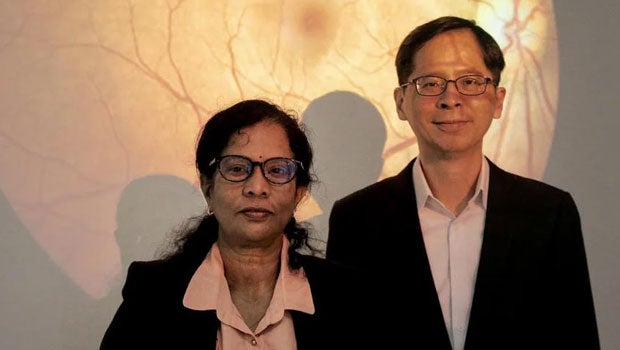
Associate professor Charumathi Sabanayagam (left) and Professor Cheng Ching-Yu from the Singapore Eye Research Institute. ST PHOTO: WALLACE WOON
SINGAPORE - Scientists from the Singapore Eye Research Institute (Seri) have developed two artificial intelligence (AI) screening tools which use eyes to assess kidney health and biological age.
The tools, dubbed RetiKid and RetiAge, use AI-based deep learning algorithms on scans of patients' retina - the light-sensitive back part of the eye, offering a non-invasive and effective approach to screening.
This can help alert patients to health concerns which may be at an early stage.
RetiKid screens patients for chronic kidney disease and works by scanning blood vessels in the eye, according to Associate Professor Charumathi Sabanayagam, who is deputy head of Seri's Ocular Epidemiology Research Group.
Currently, a patient has to undergo a blood test to measure the level of creatinine - a type of waste product made by muscles - and a urine test for albumin to check for chronic kidney disease.
Assoc Prof Charumathi, who is also principal investigator of the RetiKid study, said: "The retina and kidneys share a close biological relationship. While blood vessels in the kidneys cannot be examined readily, blood vessels in the retina can be seen directly using digital retinal photography.
"Thus, problems with blood vessels in the retina could provide clues to changes in kidney blood vessels in people with or without diabetes."
RetiAge, which was developed by Professor Cheng Ching-Yu, the head of Seri's ocular epidemiology research group and data science research platform, uses similar information to assess a patient's biological age, which measures the ageing of body functions, organs and cells.
Prof Cheng said: "Your biological age tells you about your overall health status and how the ageing process has affected your body.
"The blood vessels in the retina are also indicative of the ageing process and overall health of one's circulatory system and even the brain. By using digital technology on retinal images, we can predict a person's biological age, and in turn, their risk of systemic diseases and lifespan."
He added that the current process to determine biological age involves examining structural changes in the DNA of a patient, a laboratory intensive process that can take up to a day.
But with RetiAge, it takes just about 20 minutes, Prof Cheng said.
RetiKid also reduces the time taken to diagnose chronic kidney disease to within an hour. Currently, patients have to wait for the results after undergoing the blood test.
Assoc Prof Charumathi said that other than savings in time and manpower, these tools could also offer improved screening compliance from patients, particularly those who might be afraid of needles.
She said: "Drawing blood might not be practical in all settings. Since retinal images are acquired non-invasively, RetiKid can be applied as an effective first-level case finding tool for detecting chronic kidney disease in the general population and high-risk groups such as those with diabetes, complementing existing screening strategies.
"The most important (implication) for patients is that with early detection of chronic kidney disease, you can intervene earlier."
Both RetiKid and RetiAge are pending clinical trials and approval by the Health Sciences Authority, and will be available to patients in about two years.













 Get it on Google Play
Get it on Google Play